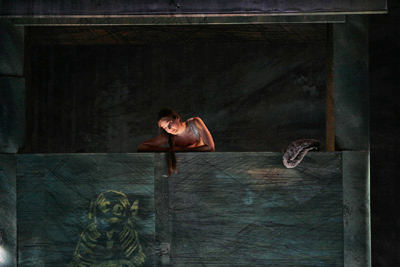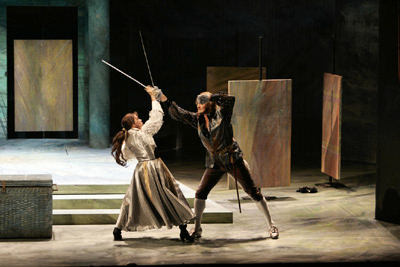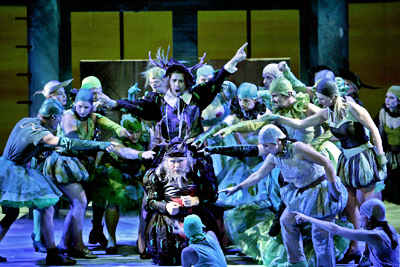Nicolai: The Merry Wives of Windsor
Soloists, Chorus and Orchestra of Staatstheater am Gärtnerplatz,
Munich 30.11.2006 (BM)

Munich’s Staatstheater am Gärtnerplatz bears a certain
similarity to the ENO in that most of its performances
are staged in the local language. Surtitles are not used
either (unlike the practice at ENO) which is an aspect
of their productions so old-fashioned that it is refreshing,
though there is nothing else old-fashioned about what
this theater does. Naturally, in this case there was no
need to translate the libretto, but despite the German
text, director Julia Riegel decided to give Otto Nicolai’s
opera back to the man who inspired it, and it is safe
to assume that the bard would have been fairly pleased
with the result!
Unlike most of her colleagues, who probably would have
thought they needed to set this 19th century
Teutonic piece in outer space, or at best in a nightclub
or a beauty salon perhaps, in order to make it interesting
for a contemporary audience, Riegel and her set designer
Caroline Neben du Mont chose a replica of London's Globe
theater and filled it with as boisterous an audience as
they come, just as one would imagine they were in Shakespeare’s
day.

The performance is action-packed, kicking off with the
brisk overture, during which energetic female cast members
chase a group of male thespians in women’s costumes off
the stage and put up a sign proclaiming: “The Merry Wives
of Windsor – Featuring Real Women Today!” What’s more,
much effort was devoted to sprucing up the connecting
dialogues with a wealth of Shakespearean quotations from
many different plays – to great effect, I might add.
The only thing this clever director wasn’t able to pull
off was what was clearly meant to be some trendy gender-bending.
There was an enormous amount of cross-dressing in the
chorus, in both directions, which, sadly, came across
more like some sort of a vaudeville act, Mrs. Reich’s
spiky purple hair being much in the same vein and looking
somewhat quaint. And Falstaff’s red jock strap did nothing
to enhance the overall impression – why insult your audience’s
intelligence like that? But the well-heeled Munich audience,
quite capable of a very deadpan reaction when a performance
is not to their liking, seemed to think differently, so
who am I to complain?

Besides, the
music more than made up for these relatively minor failings. Adrian Müller had a
precise but gentle grip on his orchestra and the clamorous chorus, the former
featuring sumptuous strings, harps included, as if he had his heart set on
saving this less recognized German composer’s honor –and indeed his Falstaff
opera has always been overshadowed by his great Italian colleague’s masterpiece.
And it was a well-deserved tribute to Nicolai: this opera is full of humor,
catchy tunes and beautifully lyrical melodies, many of which once reached the
status of pop songs, but alas not until after their composer’s untimely death at
the age of 39.
Of the
soloists in the performance on November 30th, Holger Ohlmann was
perhaps almost too soft-spoken as Falstaff and Volker Bengel a handsome Fenton,
apt at inspired phrasing but a bit constricted in the higher ranges – together
with Thérèse Wincent’s excellent Anna the balcony scene was truly enthralling.
Snejinka Avramova did well as a not in the least matronly Frau Reich, and
Torsten Frisch’s Herr Fluth was blisteringly jealous and in excellent voice
(reminding me of his marvelous Dandini in this same theater), while his “wife”,
Elaine Ortiz Arandes, was clearly in charge of the show, sweeping across the
stage as the vehement player Frau Fluth, and keeping everyone else in line with
her blazing soprano.
This
season’s remaining performances on Jan. 22nd,
May 6th, 16th and 24th,
June 18th and 24th, as well as July
8th, 2007, are definitely worth seeing!
Bettina Mara
Editorial Note: In Nicolai's setting, the Shakespearean
characters Mistress Ford and her husband, are called Fluth,
and the Pages become the Reichs.
Pictures © Ida Zenna





